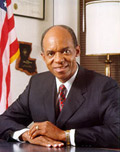| Democratic Rep. William Jefferson, accused of hiding $90,000 in bribe money in his freezer, pleaded not guilty on Friday to making and taking payoffs for helping to arrange business deals in Africa. In court, a lawyer for the Louisiana lawmaker entered a not guilty plea to all 16 counts of racketeering, soliciting bribes, fraud, money laundering, obstruction of justice, conspiracy and violating the Foreign Corrupt Practices Act. U.S. District Judge T.S. Ellis set a trial date of January 16, 2008, for Jefferson, a member of Congress since 1991 whose district includes New Orleans. The judge ordered Jefferson to surrender his passport and post a $100,000 bond. Ellis said he would allow Jefferson unrestricted travel between the Washington area and Louisiana, but he must get the judge's approval for other trips. Jefferson was accused of soliciting millions of dollars in bribes from nearly a dozen companies. The business ventures included telecommunications deals in Nigeria and Ghana, oil concessions in Equatorial Guinea, satellite transmission contracts in Botswana, Equatorial Guinea and the Republic of Congo, and a Nigerian sugar plant. According to the indictment, an FBI witness gave Jefferson $100,000 in cash intended as a bribe for an unnamed Nigerian official in 2005. It said Jefferson put in his home freezer $90,000 of the cash, which was separated into amounts of $10,000, wrapped in aluminum foil and concealed inside various frozen food containers. Representative Jefferson has not responded directly to the indictment, but his lawyer, Robert Trout, stated that his client was innocent and would "fight this indictment and clear his name." Acknowledging the comprehensive investigation carried out against his client, as detailed in the 94-page indictment, Trout pointed out that legislative action was not involved. "There is no suggestion that he promised anyone any appropriations," said Trout. "There were no earmarks. There were no government contracts." Speaker of the United States House of Representatives Nancy Pelosi expressed some concern over the allegations. "The charges in the indictment against Congressman Jefferson are extremely serious," said Pelosi. "While Mr. Jefferson, just as any other citizen, must be considered innocent until proven guilty, if these charges are proven true, they constitute an egregious and unacceptable abuse of public trust and power." If found guilty of the charges ultimately, Representative Jefferson faces a maximum sentence of 235 years. |





